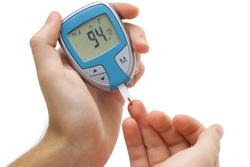
When people with Type 2 diabetes are diagnosed with cancer – a disease for which they are at higher risk – they ignore their diabetes care to focus on cancer treatment, according to new Northwestern Medicine® research. But uncontrolled high blood sugar is more likely to kill them and impairs their immune system’s ability to fight cancer.
However, people with Type 2 diabetes who received diabetes education after a cancer diagnosis were more likely to take care of their blood sugar. As a result, they had fewer visits to the emergency room, fewer hospital admissions, lower health care costs, and they tested their blood sugar levels more often than people who didn’t have the education. They also had more hemoglobin a-1c level tests at their doctor’s offices. The latter is a critical marker of how well someone has managed their diabetes and blood sugar over the last three months.
“People with diabetes hear cancer and they think that it is a death sentence, so who cares about diabetes at this point?” said June McKoy, MD, director of geriatric oncology at the Robert H. Lurie Comprehensive Cancer Center of Northwestern University. “But if they’re not careful, it’s the diabetes that will take them out of this world, not the cancer. That’s why this education is so critical when cancer comes on board. Patients must take care of both illnesses.”
McKoy, also an associate professor of medicine at Northwestern University Feinberg School of Medicine and a physician at Northwestern Memorial Hospital, is the senior author of the study recently published in the journal Population Health Management. Lauren Irizarry, a fourth-year medical student at Feinberg, is the lead author.
Uncontrolled high blood sugar can result in kidney damage and failure as well as blindness and amputation of the feet as blood vessels are damaged by excess sugar. In addition, Type 2 diabetes dampens the immune system and hampers the body’s ability to fight cancer.
“If you are not taking good care of your diabetes, your cancer suffers, too,” added McKoy.
People with diabetes have a higher incidence of liver cancer, pancreatic cancer, colon cancer, breast cancer, bladder cancer, and endometrial cancer.
For the study, researchers examined five years of health records for 166,000 commercial insurance patients and 56,000 Medicare Advantage patients. They found 65.2 percent of cancer patients who received diabetes education had their hemoglobin a-1c tested at least twice, and 88 percent had it tested at least once over three years. The numbers were significantly lower for patients who did not receive diabetes education; 48 percent of that group had hemoglobin a-1c tested twice and 78 percent had it tested once over a period of three years. Ideally, hemoglobin a-1c should be tested every four months.
The group who received diabetes education had 416 emergency room visits over three years compared to 463 who did not receive the education. In addition, the educated group had 658 hospital admissions and the uneducated had 883 admissions.
The diabetes education sessions were twice a week for four to six weeks.
“If you don’t have the power of education, you are flailing in the wind,” McKoy said. “You have to get this information and physicians really need to be information brokers for our patients. Having diabetes and then getting cancer can be overwhelming.”
The research was funded by the Medical Student Summer Research Program (MSSRP) at the Feinberg School and the grant K01 CA134554-01 from the National Cancer Institute of the National Institutes of Health.






